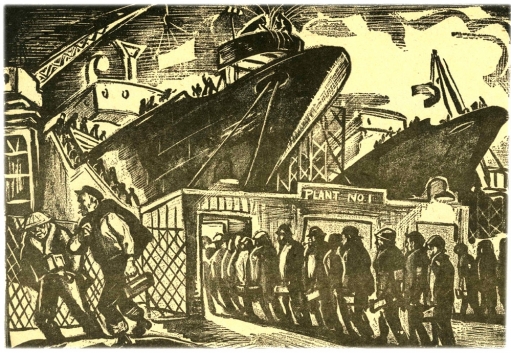World War Two - Home Front
Additional home front articles can be read here.  San Francisco shipyard by Don Freeman
San Francisco shipyard by Don Freeman"Every day in Washington, and twice on Sundays, there will be parades. You love parades. You'll never get tired of turning out for bands, even though they always stop playing just as they get opposite you.... Anyhow, there will always be the feel of parades in Washington, and the echoes of martial music, and the sight of waving flags. Where else, oh where elese, could they sing so fervently God Bless America?" Washington, D.C. has always been described as a pretty dull place and the only ones who ever seem to feel differently must have had a good deal of experiences in far worse locations. In this case, I am referring to Iowa and the war-torn portions of the South Pacific, which are the only two locations this YANK journalist had ever called home; so he liked Washington just fine. The author in question, Sergeant Merle Miller (1919 - 1986), does not ramble on about historic bone-yards or any other pedantic clap-trap, but rather presents useful information that a G.I. can apply to his life: "Of course, getting a fair date while you're in town is no problem. A Canadian newspaperman recently discovered that, judging from ration-book requests, there are 82,000 single girls of what he called the "right marrying age" of 20 to 24 in town, and only 26,000 men of the same age Therefore, he concluded, a girl has only about a 30-percent chance of getting a husband -- or, for that matter, a date"
The missing period at the close of the article, I assume, is due entirely to war-time shortages.
To read about the VJ-Day celebrations in Washington, click here. "Countless thousands of workers are pouring into Washington by train and plane, by bus and jalopy. They are herded into old rooming houses, temporary shacks, basements and attics. More than a third of the Nation's capital is 'ill-housed, ill-clothed, and ill-fed' - but boys are meeting girls all over the place - and almost twice as many marriage licenses were issued in December of 1941 as in December 1940." Here are two home front articles regarding the rationing of labor, food and steel; 1944 orders on clothing production are also touched upon. A four page article regarding the city of Brooklyn, New York during the Second World War - make no mistake about it: this is the Brooklyn that Senator Bernie Sanders inherited - it isn't far from the N.Y. borough named Queens, where numerous Communists resided.
• Almost half the penicillin that was produced in the United States came out of Brooklyn
• Forty Five percent of of the Brooklyn war plants were awarded the Army and Navy "E" or the "M" from the Maritime Services
• Throughout the war, the ranks of the U.S. Armed Services were swollen with Brooklyn sons and daughters, 280,000 strong.
Click here to read an article about one of New York's greatest mayors: Fiorello LaGuardia. A page from a 1945 YANK MAGAZINE which offers a smattering of sports info. |
MORE ARTICLES >>> PAGE: * 1 * 2 * 3 * 4 * 5 * 6 * 7 * 8 * 9 * 10 * 11 * 12 * 13 * 14 * > NEXT |
|